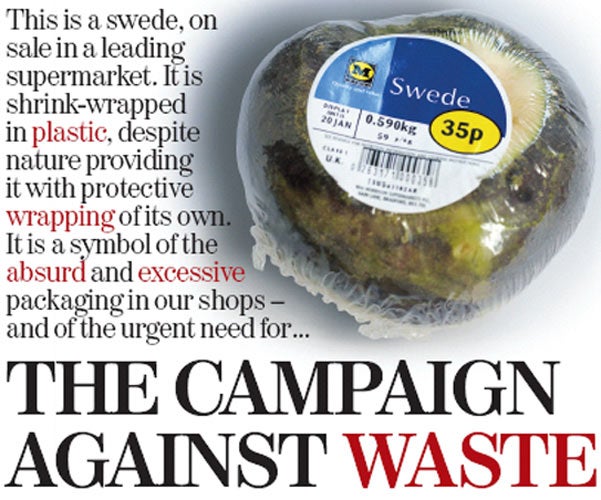Government refuses to get tough on excess packaging

Your support helps us to tell the story
From reproductive rights to climate change to Big Tech, The Independent is on the ground when the story is developing. Whether it's investigating the financials of Elon Musk's pro-Trump PAC or producing our latest documentary, 'The A Word', which shines a light on the American women fighting for reproductive rights, we know how important it is to parse out the facts from the messaging.
At such a critical moment in US history, we need reporters on the ground. Your donation allows us to keep sending journalists to speak to both sides of the story.
The Independent is trusted by Americans across the entire political spectrum. And unlike many other quality news outlets, we choose not to lock Americans out of our reporting and analysis with paywalls. We believe quality journalism should be available to everyone, paid for by those who can afford it.
Your support makes all the difference.Tougher measures to reduce the 10 million tons of packaging produced in the UK annually were ruled out by ministers yesterday.
The Environment Secretary, Caroline Spelman, also rejected a tax on plastic bags, stricter targets on manufacturers' use of raw materials and the replication of a bottle deposit scheme which campaigners claim would cut litter and save councils tens of millions of pounds a year, following opposition from retailers.
The Campaign to Protect Rural England (CPRE) had been campaigning for the reintroduction of the deposit scheme for beer and soft drink bottles popular in the UK in the 1970s. David Cameron welcomed the plan for a Deposit Refund Scheme in the Commons last September and referred it to the Climate Change Secretary, Chris Huhne.
However, the Department for Environment, Food and Rural Affairs (Defra) yesterday said uncertainties about the benefits of the scheme against other projects and opposition from business had ruled it out "for the time being". The decision came despite Defra acknowledging that a deposit system could improve recycling and cut litter.
Setting out its plan in a report last September called Have We Got the Bottle?, the CPRE proposed charging consumers an extra 15p on drink cans and glass and plastic bottles under 500ml and 30p on anything larger. The money would be given back to shoppers if they returned the containers, giving them an incentive to recycle.
Of the £700m annual cost of running the scheme, the CPRE estimated most would be paid from unclaimed deposits, councils would save £160m from avoided household recycling collection, £69m would come from reduced greenhouse gas emissions, and £1.2bn from the economic and environmental benefits of less litter.
In 2007, The Independent launched a campaign against excessive packaging highlighting the environmental damage and hassle to shoppers caused by wrapping products in overly heavy paper, card and plastic. Since then, some leading retailers have reduced the average weight of their packaging, but the volume is increasing by 1 per cent a year due to more products being sold.
Samantha Harding, of the CPRE, said the Waste Review had been "a huge missed opportunity": "The Government seems determined to keep trying the same old failed approaches."
Join our commenting forum
Join thought-provoking conversations, follow other Independent readers and see their replies
Comments